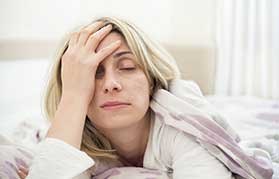Insomnia Treatment with Hormone Therapy in Dover, NH

Everyone has trouble falling asleep sometimes, but when the condition happens repeatedly it can begin to affect multiple aspects of your life. Insomnia can impact your ability to function at school, in the workplace, and even at home.
Symptoms of Insomnia
Insomnia can be defined as a number of different symptoms:
- Having trouble falling asleep
- Having trouble staying asleep
- Waking up feeling unrested
Getting six hours or fewer of sleep for multiple nights in a row can also have an adverse effect on your health. Some of the conditions that can arise from insomnia include:
- Fatigue
- Irritability
- Depression
- Anxiety
- Trouble concentrating
- Headaches
- Gastrointestinal problems like stomach pain, heartburn, diarrhea, constipation, nausea and vomiting
Types of Insomnia
Insomnia can occur for a short period of time (acute), or you may experience a lack of sleep for longer stretches (chronic). Regardless of the duration, healthcare practitioners agree that there are two different types of insomnia.
Primary Insomnia
The first type is known as primary insomnia. In this form, the loss of sleep does not appear to be related to any other symptom.
Secondary Insomnia
In secondary insomnia, your healthcare provider can generally identify a contributing factor to your insomnia such as a preexisting health condition, prescription medication or another substance such as caffeine, nicotine or alcohol.
With secondary insomnia, the cause could be physical, emotional or even changes in your daily routines. Over time, a loss of sleep will begin to impact your health by weakening your immune system. This could lead to weight gain and an increased risk for developing high blood pressure, heart disease, or diabetes .
Causes of Insomnia
Hormonal imbalance can easily lead to insomnia. In particular melatonin , a hormone produced by your pineal gland can be over- or under- produced. Melatonin regulates your body's sleep cycle, or circadian rhythm.
Similarly, insomnia can be a result of menopause in women or andropause in men.
Some other factors that could lead to insomnia are:
- Stress
- Anxiety
- Depression
- Medical conditions like chronic pain or respiratory problems
Insomnia Diagnosis
The first step in treating insomnia is to single out the reason it is happening. A typical insomnia treatment plan begins with a review of your current sleep patterns. During this consultation your doctor may discuss how frequently you wake up in the middle of the night, or how long it may take you to fall asleep. In some cases, a sleep diary is recommended to help log these patterns as they occur.
The consultation will generally be accompanied by a physical exam to check for any health conditions that could be the culprit. A blood sample may also be taken to check for any conditions such as diabetes .
Another test which is specific to diagnosing insomnia could be performed in a sleep center. During an overnight visit, a sleep doctor can monitor factors such as brain waves, breathing, heartbeat, eye movement and body movement while you sleep.
Insomnia Treatment
A more safe, effective way to treat insomnia is with bioidentical hormone replacement therapy , or BHRT. Unlike conventional hormone replacement therapy (HRT), BHRT treats insomnia by balancing your melatonin , estrogen (oestrogen) or testosterone levels with hormones that are biologically identical to those your body produces.
BHRT can be delivered through pills, patches, tablets, creams and injected pellets. It's important to note that a provider typically won't utilize all of these hormone delivery methods. The best one for a given situation depends on the needs of the patient and the preference of provider.
Some alternate forms of insomnia treatment include:
- Lifestyle changes including diet and physical activity
- Relaxation exercises
- Cognitive behavior therapy
Get Better Sleep
Bioidentical hormone replacement therapy can provide relief for insomnia. If you're struggling with sleep and think a hormone imbalance may be the cause, please call (207) 536-9661 or contact Vibrant Health Naturopathic Medical Center online.
Vibrant Health Naturopathic Medical Center
Address
501 Islington StSuite 2B
Portsmouth, NH 03801
(207) 536-9661
www.vibranthealthnaturalmedicine.com
Hours
Mon:
9:00 am - 5:00 pm
Tue:
9:00 am - 5:00 pm
Wed:
10:30 am - 5:00 pm
Thu:
9:00 am - 5:00 pm
Fri:
10:00 am - 4:00 pm
Sat:
Closed
Sun:
Closed

